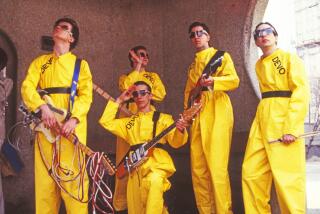MGMT’s new album shows it can still keep music world guessing

- Share via
The creation story behind “Astro-Mancy,” MGMT’s rhythmic freakout on its self-titled new album, is instructive when considering the duo’s oblong output over the years. A band best known for its string of genre-defying dance-pop hits of 2008, “Time to Pretend,” “Kids” and “Electric Feel,” MGMT has since its rise succeeded in upending expectations — sometimes in mystifying ways.
Despite the whirling rhythms and psychedelic electronic noise rolling within, “Astro-Mancy” was born of a failed attempt to rein it in a bit. Which perhaps makes sense. The last album, “Congratulations,” was an odd, angular affair, at least given MGMT’s early history of dance-along, sing-along hits. The new stuff splits the difference.
“We were trying to write a song and be traditional about it — come up with some sort of chord progression or hook,” said Benjamin Goldwasser on a recent Sunday afternoon in downtown Los Angeles. His musical partner Andrew VanWyngarden, with hair like Donovan’s circa 1968, sat on a couch across from him.
RELATED: Best albums of 2013 so far | Randall Roberts
You wouldn’t guess by their demeanor that they’d be capable of fronting a headstrong, wildly experimental rock band able to push at the edges of pop while exploring the music’s long, strange history. A few hours later, though, they’d do just that, performing new and old music for thousands at the FYF Festival, where their beat-heavy mantras, meandering pop songs and imagistic aesthetics were on full, primal display.
Working on a song for their third album for Columbia Records at producer Dave Fridmann’s studio in rural New York, the pair started messing with the chord sketch until it was thick with layers. “We kept overdubbing all these things, and slowly it turned into less and less of a pop song, until you could barely even make out the chord progression in some ways,” said Goldwasser.
A pure and blissful psychedelic dance rock song, the jam echoes such sounds, among others, as Beatles’ “Revolver”-era studio experiments, King Tubby’s twisted Jamaican dub and lysergic Pink Floyd hallucinations. It’s virtually everything except the traditional song the duo set out to make. Halfway in, the piece moves into an escalated groove that seems to seize control — the music working the players instead of vice versa, as if part of some grand plan.
PHOTOS: Unexpected musical collaborations
MGMT (shortened from the Management because another band had already claimed the name) was born at Wesleyan University in the mid-’00s, where the two met as music majors. Part of their formative work, recalled VanWyngarden, was to suggest pop music world domination, to “mimic or act like we were huge pop stars — and the irony was we were playing in front of 10 people in a dorm room. We had this running joke between us that we wanted to get as hugely popular as possible and then really bombastically destroy it all. So there is that drive to subvert things from the inside in our music or ethos.”
Evidence they’re succeeding: Their new single is the bleakly themed “Your Life Is a Lie,” which they recently performed on “Late Show With David Letterman,” to much bafflement from the Internet. The performance featured a giant cowbell on which was written in bold letters, “BE AWARE.” VanWyngarden, wearing sparkly star-shaped sunglasses, clanged on it in rhythm while singing the lines: “Here’s the deal/Open your eyes/Your life is a lie/Don’t say a word.”
MGMT laid out its own fictional life for “Time to Pretend,” its best known song. Featuring a plunky synth melody and lyrics that imagine the band’s ascent, fame and ultimate demise, the song opens with VanWyngarden admitting a desire to “make some music, make some money, find some models for wives” and moves to imagining children with, then divorce from, said models. No problem, he sings wryly: “We’ll find some more models — everything must run its course.”
The song concludes with the two choking on their own vomit, rock-star style, and dying: “That will be the end,” VanWyngarden sings as the catchy synthesizer melody propels the song toward verse: “We were fated to pretend.”
Somewhat miraculously, the band nearly achieved the level of fame it predicted — only to veer off in a wildly divergent path on “Congratulations.” Released in 2011 to a mostly baffled populace, “Congratulations” was a gymnastic guitar rock maneuver. VanWyngarden aptly described the record as having “a sort of cartoon wacky vibe.”
For the 10 songs that became “MGMT,” the two, working only as a pair, dedicated themselves to exploring something more basic, which required long jam sessions, some extending to three hours. Working full time in a studio featuring sleeping quarters and space to roam, lyricist VanWyngarden channeled lines via “isolated little lyric writing moments in the studio. I’d just go upstairs to my bedroom, take a few books or something, or go walk around outside.” The quiet of rural New York was far removed from the noise of their Brooklyn home base.
Downstairs, though, with their favorite gear surrounding them, Goldwasser and VanWyngarden were getting gone, intent on constructing songs from bits and pieces of energy within their improvisational sessions. Though the latter sang and wrote all the lyrics, in the studio their roles were less defined; both play many instruments and continually swapped roles during the recording.
INTERACTIVE: A festival for every fan – SoCal’s yearly sonic lineup
“We felt like it almost got to a point where we were in some sort of altered state, just channeling, or in the zone, or whatever you want to call it. It almost felt like automatic music making,” said VanWyngarden. “That helped us feel a little bit more free and open, and wanting to explore whatever came into our heads.”
What landed on tape were a batch of songs built from what they estimate to be 100 hours of recordings. Many are singalong catchy, but in their own surrealistic way. The first single, “Alien Days,” suggests “Uncle Albert”-era Paul McCartney (an avowed MGMT fan): a grand-gesture pop rock song about nostalgia featuring “sequins in the eyes,” “decades in the drain” and “monograms on the brain.”
“Mystery Disease” begins with the sound of a UFO landing before launching into a dystopian, echoed world in which a strange virus “not in any of the books that you read” is wreaking havoc. As breakbeat snare drums reverberate and washes of synthesizer pan from right to left, VanWyngarden wanders the landscape surveying the devastation. “Lovers in a past life, meet in the street close to midnight/The last look, sweet like the end of a dream/We fall back into the mystery disease.”
Chart-topping themes they’re not, but despite the experimental nature of the recording process executives at Columbia weren’t blindsided by their direction, said Goldwasser, who described them as “very encouraging.”
VanWyngarden added that Fridmann’s skills reassured the label. The producer has recorded artists including the Flaming Lips, Tame Impala, Sparklehorse and Sleater-Kinney. “I think they were really impressed with the sonic quality of it this time. There’s a marked difference between our first two albums and the new one,” VanWyngarden said. “This one has a certain atmosphere and space to it, which I think is something we’ve always wanted to get closer to.”
The band displayed both later that night, where it played a typically tripped-out performance at the FYF Festival. Featuring hallucinogenic screen projections and computer animation more worthy of MOMA than FYF, the gig ran in a predictable MGMT pattern. That is, it veered completely off-course when, before performing the new single, the pair and their backup players introduced a non-sequitur guest: Henry Winkler, who clanged the jumbo cowbell during “Your Life Is a Lie.”
Of course.
More to Read
The biggest entertainment stories
Get our big stories about Hollywood, film, television, music, arts, culture and more right in your inbox as soon as they publish.
You may occasionally receive promotional content from the Los Angeles Times.










